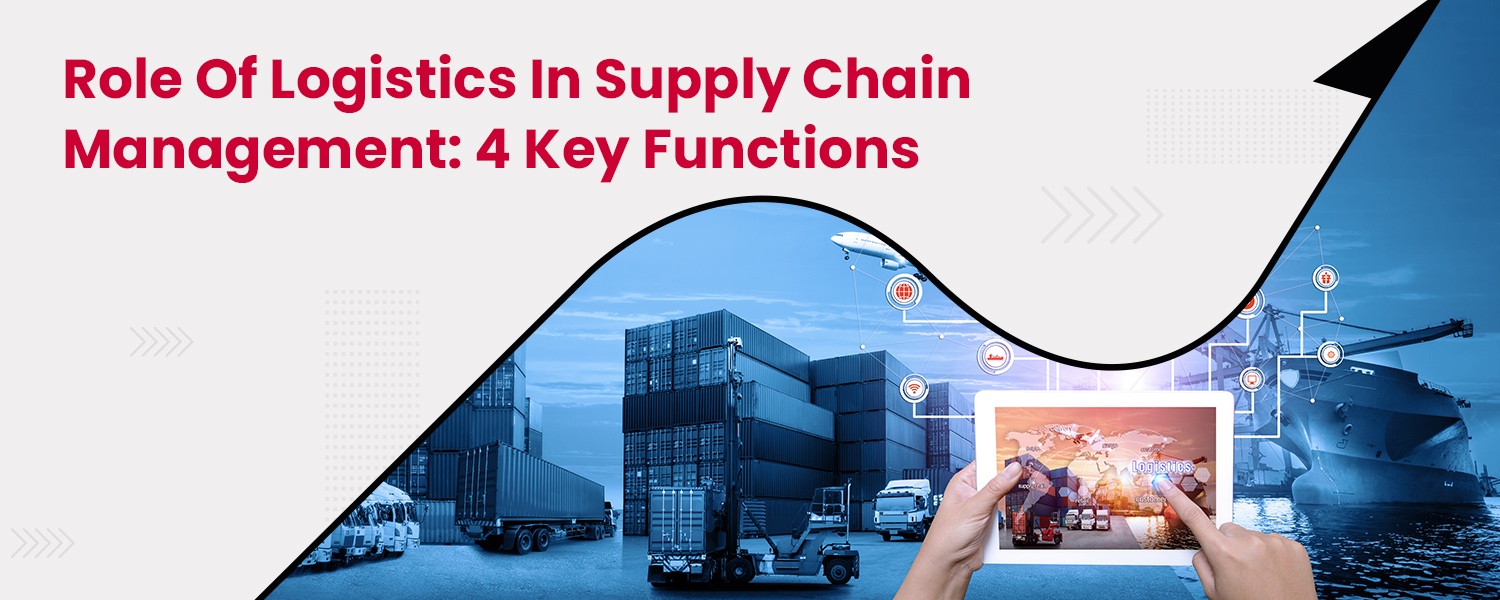What is supply chain management? The answer would be managing and coordinating the entire flow of goods and services, from production and supply to delivery of the product to customers. Now, how would you coordinate this entire flow of a supply chain? Yes, through logistics. The role of logistics in supply chain management is much more decisive than just trucking goods from here to there. The entire flow of a supply chain depends on logistics.
The Indian eCommerce retail logistics market is expected to grow at a 24 percent CAGR to $6.3 billion in FY26, up from $2.2 billion in FY21. The numbers clearly show that Indian eCommerce retailers understand the importance of logistics. Through an efficient logistics system, you can lower the wastage of resources, reduce operational costs, improve customer satisfaction, and much more. So, let’s understand the topic of logistics in the supply chain deeply in this blog.
The Role Of Logistics In Supply Chain Management
Sourcing of Goods
Logistics plays a crucial role in the strategic sourcing of goods. Primarily sourcing goods means finding and vetting the supplier who can supply goods at the best value. Still, it also includes calculating backorder delays, extraneous fees, shipment costs, and warehousing costs which logistics plays a big role in managing. Finding the right raw material source demands a good understanding of all these contributing factors, and logistics help streamline all of them.
Transportation
The fundamental of logistics is transporting goods from one place to another, and transportation is the way of different interconnecting processes of a supply chain. As an eCommerce brand, you must select the best mode of shipment— air, water, or land– based on the distance, shipment cost, availability, and route condition. The transport infrastructure should be carefully studied for the efficiency of the supply chain and to ensure fast delivery most cost-effectively. In India, the best means of domestic shipment is rail transport, but with many ramifications and hindrances, most businesses choose road transport for domestic shipping.
Order Fulfillment
Order fulfilment is the process of accepting orders from customers, processing them, and delivering them to the customers. This is where the efficiency of a logistics system is tested. The role of logistics in order fulfilment is picking orders from the warehouse, rightly packaging and labeling them, and then shipping them to the customers. This role gets more crucial as the consumer demands their order faster, within the same day. Nowadays, order processing is more technology-driven than manual, but the last-mile delivery is still completed manually, which needs an efficient logistics infrastructure.
Packaging
During handling and transportation, the product is prone to any damage that it could get while shipping from point A to B. Therefore, good packaging is important to ensure the safety of products. Moreover, customers also judge brands over the packaging of the products they order.
Warehouse Management
Warehouse management and logistics operations as one to enable last-mile delivery. The inventory in warehouses is scheduled and placed according to the logistics requirement. For example, goods that are ordered frequently or need to be transported are placed at the front of warehouses for easy commuting. Whereas products that are low in demand are placed at the back of warehouses relatively, and perishable products are rotated frequently, so those old items are shipped out first.
Demand Forecasting
The Demand Forecasting for a product is one of the roles of logistics that modern businesses utilize. Logistics help ensure that the supply chain can control uncontrollable conditions. It also ensures that businesses can manage the high demand for certain items and can make informed decisions by predicting customers’ behaviors.
Return Management
Managing returns is equally important as order fulfilment for eCommerce businesses to cut unnecessary waste. Like logistics plays a role in delivering goods to customers, it also plays a crucial role in getting them back from the customers if they request.
Last-mile Delivery
Last-mile delivery becomes one of the important factors in customer satisfaction, and this can only be possible through an efficient logistics system. It helps organizations to react quickly to every order received from the customer without any delays or bottlenecks.
Types Of Logistics In Supply Chain Management
Inbound Logistics
Inbound logistics is all about the transportation of goods or raw materials from suppliers to companies. It is the process of transporting or passing goods and services from the suppliers to warehouses to production. It mainly focuses on passing goods to the respective departments for further production. The scope of inbound logistics also covers tracking of location and analyzing the price quotes and receipts.
Outbound Logistics
Outbound logistics activates at the end of a supply chain, which is all about delivering finished products to the end customers. It involves optimizing delivery routes, inventory management, packaging, and order fulfilment. You can hire a logistics partner specializing in last-mile delivery for outbound logistics. In addition, you can self-search or take help from logistics aggregators like NimbusPost, who can help you find value-centric logistics partners.
Reverse Logistics
Reverse logistics has been neglected for many years, but because eCommerce brands focus on enhancing customer experience, reverse logistics is becoming a crucial part of the supply chain. It is the process of transportation of goods from the end-user to the supply chain. Reverse logistics involves reusing packaging, refurbishing, and recycling products that the customer returns.
What Are The 4 Key Processes In Logistics?
Supplier And Manufacturer
Sourcing raw materials from a supplier and manufacturer are the first process of the supply chain and a company’s logistics system. A trustworthy supplier always ensures the delivery of high-quality material at the best price by tracking the work-in-process inventory stage. The timely delivery of raw materials from suppliers is the base of an efficient supply chain process and reflects customer satisfaction. This is only possible if a company has a robust logistics system.
Distributing Fulfillment Centers
Logistics is heavily involved in order fulfilment. Each item is picked, packed, and shipped through logistics from fulfilment centers- warehouses that hold inventory nearby to the end customers.
Warehousing
Warehousing is the logistics process of transferring finished products from the manufacturing department to warehouses. This logistics process involves transferring goods safely, inventory control, and tracking items to know their current status.
Shipping
Shipping is the last but very important part of the logistics process, which is delivering items to the customers safely and as soon as possible. To optimize the shipping process, you can analyze the shipping routes, detect potential obstacles, and optimize accordingly, strategically establishing fulfilment centers near the customers to enable fast delivery. You can also choose which shipping method to offer your customers– via ground, air, or water, and to which location.
4 Key Functions Of Logistics In Supply Chain Management
Processing Orders
Processing or submitting orders is one of the main functions of logistics in supply chain management. The orders must be processed as soon as possible when received from the customers. Traditionally it is executed through the mail, phone calls, etc., but today, more efficient systems are developed which automate the whole process. As a result, logistics allows companies to receive, record, assemble and distribute customer orders in the shortest period.
The process of order processing is as follows:
Order placement:
Accepting orders from customers as soon as possible and placing orders for delivery.
Picking inventory:
Picking the ordered item from the inventory and recording it into the system.
Sorting:
Sorting is segregating orders according to the destination after picking from the inventory.
Packing:
Order packing is packing all orders correctly to deliver them to the end customer safely.
Shipping:
Shipping is delivering the ordered package to the customers as soon as possible.
Inventory Management
Another important function of logistics is managing inventory. Inventory management involves complex processes but restocking the warehouses safely, tracking them, and delivery to the customers is the primary function of logistics in inventory management. Inventory management is called the worst offender of the supply chain, and it eats the company’s profits if not done correctly. It involves costs like inventory funding, security, warehousing damages, repairs, and protection from theft.
Moreover, it also determines the speed of production and requires valuable insights to forecast the demand for products in the market, stocking them accordingly. Therefore, modern businesses adopt a Just-In-Time inventory management system which relatively increases efficiency and cost-effectiveness.
Monitoring
Monitoring and tracking different processes is crucial to gain clear visibility and avoiding loopholes in the supply chain. eCommerce businesses that keep inventory, transport, and fleet up-to-date tend to manage and survive the unforeseen situations used to come with running an online store. Moreover, you should monitor various means of logistics available, prices, and other variables before choosing a carrier.
Storage
Material handling and storage is the movement, protection, and control of materials throughout warehousing, inventory management, and distribution. This heavily depends on the efficiency of logistics. Although effective material handling and storage decrease the cost and wastage in the supply chain, it also improves the efficiency of the logistics system by reducing item breakage, safely transporting inventory, and removing overhead expenses.
Conclusion
Running an eCommerce business heavily depends on an efficient supply chain. That’s why supply chain management is the backbone, and logistics is the lifeblood of any business. Now that you know the role of logistics and its critical functions in supply chain management, you only need to implement what you’ve learned. However, If you’re running an eCommerce business or will run one in the future, you may need clarification in finding the right logistic partner. Therefore, we recommend NimbusPost as a logistics aggregator, a comprehensive solution for every logistics problem.




